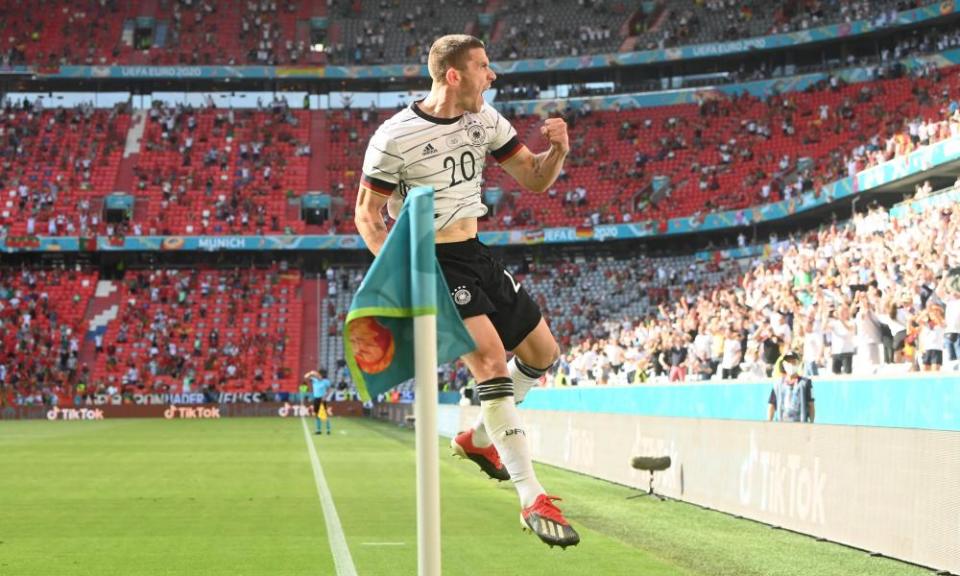Joachim Löw’s Germany recast as Euro 2020’s popular entertainers

“The tournament can begin,” as Toni Kroos drily observed. And certainly after the disappointment against France on Tuesday night it was impossible to watch Germany’s breezy, brassy win over Portugal on Saturday without wondering whether it might just be the start of something: a stirring, an awakening, a team and a system and perhaps even an idea twitching belatedly to life.
As the goals piled up, as Germany’s flying wing-backs sliced and shredded the defending champions – Rúben Dias, Pepe and all – on their way to a 4-2 triumph, the temptation was to declare that this was a film we had all seen before. Right on cue, and with perfect timing, The Germans (and for some reason it always is The Germans, never just Germany) have finally turned up. The Germans are coming. Never, ever write off The Germans.
Related: Unlikely hero Robin Gosens shows Germany anything is possible | Marcus Christenson
Naturally this is a footballing instinct conditioned and honed by decades of actual history, imperfect memory and impeccable national myth-making. The idea of Germany as the ultimate Turniermannschaft – the restrained, imperious “tournament team” that husbands its energies, keeps its cool and manages to peak just when it matters – remains a potent and irrepressible trope to Germans and foreigners alike, one that has endured well beyond the point where it is justified by reality.
It is worth recalling that many of the ominous pronouncements being made about Germany now were also being produced in 2018, after Kroos’s thrilling last-minute free-kick in the second group game against Sweden. That triumph proved to be illusory; this may not, and yet in a way the same fallacy underpins both. For a team of supposedly peerless tournament pedigree, Germany have arguably underperformed over the last 25 years: one win, two finals and at least three semi-final chokes a slightly disappointing return on a generation of such abundant talent.
The wider point, though, is not so much what Germany have achieved as the manner in which they have achieved it. Over the last decade, Joachim Löw’s side have actually become the very antithesis of the Turniermannschaft, the sober and reliable tournament performer. Instead, with their relentless full-throttle approach, embrace of chaos and vulnerability to the counterattack, they have become the popular entertainers of international football: richly gifted, crowd-pleasing and often wildly inconsistent from one game to the next. This is a team that can lose 6-0 to Spain and 2-1 to North Macedonia and yet still, somehow, retains the ring of potential champions.
Is this the most fun German team in history? The 2014 team were certainly better on paper (and even they went from 1-0 to 7-1 to 1-0 in three consecutive games). The 2018 team outstripped them for sheer seat-of-your-pants, Manuel-Neuer-in-the-opposition-half craziness. But there were flashes and passages against Portugal that in their expressiveness and exuberance were the equal of almost anything a recent German side has produced.
Fighting for their tournament lives, Germany did not retreat into their shells but exploded out of them. The 3-4-3 that was really a 3-2-5 pressed daringly high up the pitch, pinged the ball from flank to flank like freestylers playing keepy-uppies across a six-lane motorway, flooded the penalty area with white shirts. All five German goals – four of them legal and one, a spectacular volley by Robin Gosens that was ruled out for offside – either originated with the wing-backs or were finished by them, or often both.
The Atalanta left-back Gosens is an agreeably winsome character: the fullest expression of this modern Germany and yet one has not played a minute of top-flight German football, a recognisably human character in an industrialised, academy-polished team. Elsewhere you had the unflappable genius of Joshua Kimmich on the opposite flank, the restless desire of Serge Gnabry, the flawless instinct of Kai Havertz up front, who looks like a Habsburg prince going through his difficult goth phase.
Related: Gosens inspires resurgent Germany to thrilling 4-2 victory over Portugal
It was brilliant, demented fun. And yet, in a strangely protective way, you still worry a little about this team: particularly when they come up against opponents less receptive to their high-rolling style. Portugal essentially spooked themselves in Munich: Fernando Santos withdrawing the dangerous Bernardo Silva at half-time and changing formations at least twice. Still they managed to score two laughably easy goals, one on the break and one at a set piece, and could have had more. Hungary, Germany’s next opponents, managed to hold world champions France to a 1-1 draw by relying almost entirely on those two tactics.
This is not 2018 and Germany are (probably) not about to crash out of their own party. But many of the underlying flaws from Russia have been left unaddressed: a slightly chewy centre, weird lapses of concentration at the back, a coach who seems increasingly unsure of himself. Equally, this is a team that is more likeable, more enterprising and more purely enjoyable than any of its recent predecessors. It could crash and burn, or it could fill the sky with flame. Either way, you suspect it’s going to be terrific fun finding out.

 Yahoo Sport
Yahoo Sport 





































